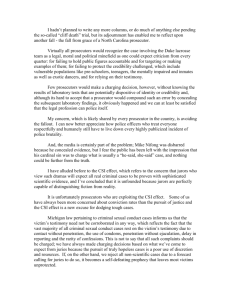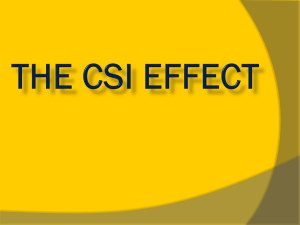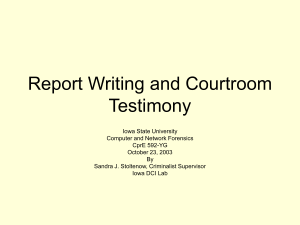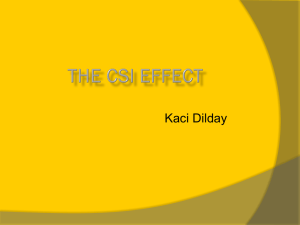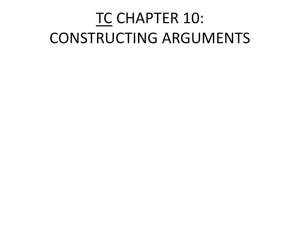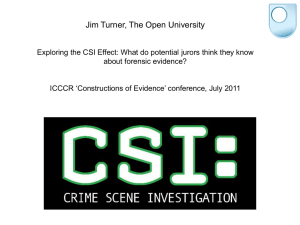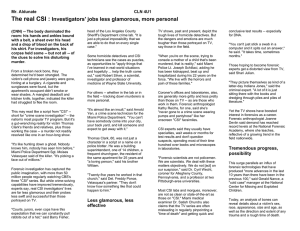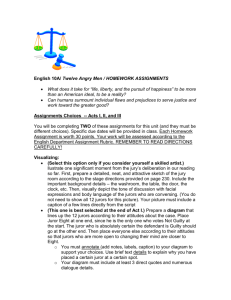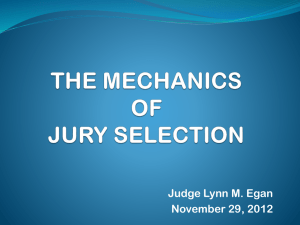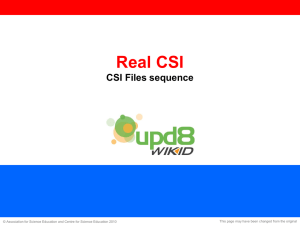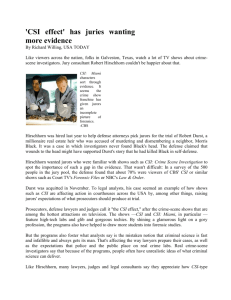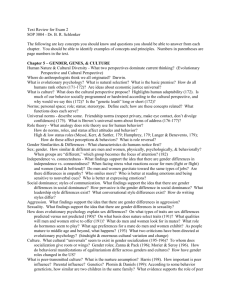CSI_Effect1
advertisement
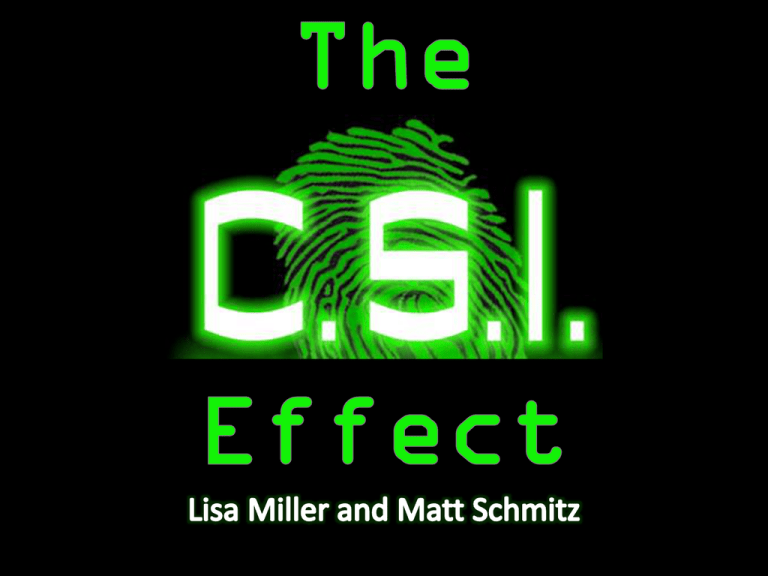
“A phenomenon reported by prosecutors who claim that television shows based on scientific crime solving have made actual jurors reluctant to vote to convict when, as is typically true, forensic evidence is neither necessary or available.” -Nolo’s Plain-English Law Dictionary Watching television shows like CSI and Cold Case Files give citizens a distorted view of how forensic evidence is found and what technology is available to forensic scientists. Some examples include: Process times for DNA/fingerprints Getting molds of wounds to match to weapons Amount of information you can get from a piece of evidence Jurors in criminal cases may fail to convict someone who is guilty due to a lack of high-tech physical evidence Very few cases go to trial, and the ones that do are the violent offenders If true, the CSI Effect will force prosecutors to change their courtroom techniques in order to convince jurors that the defendant is guilty CRIME-SHOW-VIEWING HABITS AND PUBLIC ATTITUDES TOWARD FORENSIC EVIDENCE: THE "CSI EFFECT" REVISITED* Questions: Do jurors consider some forms of evidence as more reliable than others? Are there certain forms of testimony that increase the public's confidence in the reliability of evidence? Do crime-show viewing habits have any effect on these assessments? Results of the study “DNA was considered to be the most reliable (89.5 percent), with fingerprints (78.8 percent), medical expert testimony (30.3 percent), police testimony (23.3 percent), victim testimony (21.2 percent), and eyewitness testimony (21.2 percent) following behind. The respondents found all forms of "science-based" (i.e., DNA and fingerprint) evidence to be more reliable than victim, police, and eyewitness testimony.” People who watched three or more hours of crime shows per week were less likely to convict in rape or murder cases without scientific evidence. The greater the number of hours spent watching crime and justice programs, the more reliable the respondents found these forms of evidence Crime show viewing habits directly affected a respondent's belief about their willingness to convict without scientific evidence http://www.cbs.com/shows/csi_miami/video /?vs=Full%20Episodes • This must identify and eliminate biased jurors from the panel • United states v Harrington – multiple felony drug trafficking charges • Harrington argued that the court lessened the courts burden of proof in his case by using only “in-court” evidence. 1. Can the juror make the distinction between the fictional cases depicted on the CSI-type shows and real cases? 2. Can the juror convict even if CSI-type evidence is not presented? 3. Does the juror understand that some of the tests and investigation procedures used on television shows may not even be possible in real life? • Keep an open mind • Don’t make conclusions about the case until all the evidence is heard • Don’t discuss the case with anyone until the end of the case • At the end of the case, only discuss the case with their fellow impaneled jurors who have taken an oath to be fair and have heard all admissible evidence. • Don’t read news accounts about the case • Don’t conduct any personal investigation What is evidence? The exhibits which are to be received into evidence The sworn testimony of any witness And facts to which all lawyers stipulate What is not evidence? Statements, arguments, questions, and objections of the attorneys Testimony that the judge instructs you to disregard Anything that the juror may see or hear when the court is not in session even if what you see or hear is done or said by one of the parties or by one of the witnesses. Crucial to a fair and effective deliberation because it reminds the jurors to avoid analyzing the facts of the case through the lens of fiction It is legally correct to instruct jurors that prosecutors are not required to use particular kinds of evidence like scientific forensic evidence to prove guilt Also called Evans type instruction • Baskin, D. R., & Sommers, I. B. (2010). Crime Show-Viewing Habits and Public Attitudes Toward Forensic Evidence: The “CSI” Effect Revisited*. Justice System Journal, 97- 113. • CSI:Miami. (2012, February 12). Retrieved from CBS: http://www.cbs.com/shows/csi_miami/video/?vs=Full%2 0Episodes • Google Images for background pictures • Lawson, T. F. (2009). Before the verdict and beyond the verdict: The csi infection within modern criminal jury trials. Loyola University Chicago Law Journal, 41, 119-173. • Nolo's Plain-English Law Dictionary. (2012).
